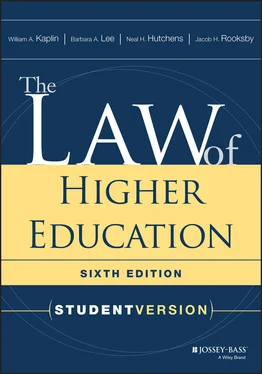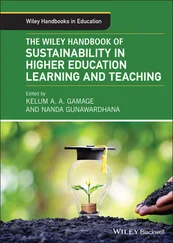For further developments in the State of Washington, subsequent to Witters I and Witters II , see State ex rel. Mary Gallwey v. Grimm, 48 P.3d 274 (Wash. 2002). And for more recent developments in the State of Washington, subsequent to Mary Gallwey , see Davey v. Locke , 299 F.3d 748 (9th Cir. 2002), rvsd ., Locke v. Davey , 540 U.S. 712 (2004), discussed immediately below.
Locke v. Davey involved a free exercise clause challenge to yet another of the State of Washington's student financial aid programs. In its opinion rejecting the challenge, the U.S. Supreme Court probed the relationship between the federal Constitution's two religion clauses and the relationship between these clauses and the religion clauses in state constitutions.
At issue was Washington's Promise Scholarship Program which provided scholarships to academically gifted students for use at either public or private institutions—including religiously affiliated institutions—in the state. Consistent with its interpretation of article I, section 11 of the state constitution in Witters II , however, the Washington Supreme Court stipulated that aid may not be awarded to “any student who is pursuing a degree in theology” (see Wash. Rev. Code § 28B.10.814). The plaintiff, Joshua Davey, had been awarded a Promise Scholarship and decided to attend a Christian college in the state to pursue a double major in pastoral ministries and business administration. When he subsequently learned that the pastoral ministries degree would be considered a degree in theology and that he could not use his Promise Scholarship for this purpose, Davey declined the scholarship. He then sued the state, alleging violations of his First Amendment speech, establishment, and free exercise rights as well as a violation of his equal protection rights under the Fourteenth Amendment.
In the federal district court, Davey lost on all counts. On appeal, however, the U.S. Court of Appeals for the Ninth Circuit upheld Davey's free exercise claim. Applying strict scrutiny, the appellate court invalidated the state's exclusion of Davey from the scholarship program “based on his being a theology major.” By a 7-2 vote, the U.S. Supreme Court reversed the Ninth Circuit and upheld the state's exclusion of theology degrees from the Promise Scholarship Program. In the majority opinion by Chief Justice Rehnquist, the Court declined to apply strict scrutiny analysis. Characterizing the dispute as one that implicated both the free exercise clause and the establishment clause of the federal Constitution, the Court recognized that “these two clauses…are frequently in tension” but that there is “play in the joints” (540 U.S. at 718, quoting Walz v. Tax Comm ' n of City of New York , 397 U.S. 664, 669 (1970)) that provides states some discretion to work out the tensions between the two clauses. In particular, a state may sometimes give precedence to the anti-establishment values embedded in its own state constitution rather than the federal free exercise interests of particular individuals. To implement this “play in the joints” principle, the Court applied a standard of review that was less strict than the standard it had usually applied to cases of religious discrimination.
Under the Court's prior decision in Witters I (above), “the State could… permit Promise Scholars to pursue a degree in devotional theology” (emphasis added). It did not necessarily follow, however, that the federal free exercise clause would require the state to cover students pursuing theology degrees. The question therefore was “whether Washington, pursuant to its own constitution…[as authoritatively interpreted by the state courts],…can deny theology ‘students funding for religious instruction without violating the [federal] Free Exercise Clause'” (540 U.S. at 719).
The Court found that “[t]he State has merely chosen not to fund a distinct category of instruction”—an action that “places a relatively minor burden on Promise Scholars” (540 U.S. at 721, 725). Moreover, the state's different treatment of theology majors was not based on “hostility toward religion,” nor did the “history or text of Article I, § 11 of the Washington Constitution…[suggest] animus towards religion.” The difference instead reflects the state's “historic and substantial state interest,” reflected in article I, section 11, in declining to support religion by funding the religious training of the clergy. Based on these considerations, and applying its lesser scrutiny standard, the Court held that the State of Washington's exclusion of theology majors from the Promise Scholarship Program did not violate the free exercise clause.
The Court has thus created, in Locke v. Davey , a kind of balancing test for certain free exercise cases in which a state's different treatment of religion does not evince “hostility” or “animus” toward religion. Under this balancing test, the extent of the burden the state has placed on religious practice is weighed against the substantiality of the state's interest in promoting anti-establishment values. The lesser scrutiny that this balancing test produces stands in marked contrast to both the strict scrutiny required in cases like Lukumi Babalu Aye, 508 U.S. 520 (1993) and the minimal scrutiny used in cases, like Employment Division v. Smith ( Section 1.6.2above), that involve religiously neutral statutes of general applicability. Some of the Court's reasoning supporting this balancing test and its application to the Promise Scholarships seems questionable, 11 as Justice Scalia pointed out in a dissent (540 U.S. at 731–32). Moreover, the circumstances in which the balancing test should be used—beyond the specific circumstance of a government aid program such as that in Locke —are unclear. But the 7-2 vote upholding Washington's action nevertheless indicates strong support for a flexible and somewhat deferential approach to free exercise issues arising in programs of government support for higher education and, more specifically, strong support for the exclusion (if the state so chooses) of theological and ministerial education from state student aid programs—at least when the applicable state constitution has a strong anti-establishment clause.
In 2017, the U.S. Supreme Court addressed yet another area of concern regarding government support for religion. The issues concerned whether or when government agencies must include churches, other religious organizations, and religious observers in government programs providing services or financial assistance to secular organizations and nonreligious persons. The case, Trinity Lutheran Church of Columbia v. Comer , 137 S. Ct. 2012 (2017), features the free exercise clause rather than the establishment clause. Although Trinity Lutheran is not a higher education case, it is important to higher education because analogous issues may arise in that context and the applicable case law may be much the same.
In Trinity Lutheran , the Church had a Child Learning Center that operated under the auspices of the church on church property. The Center is open to children irrespective of religious persuasion. The Center had a playground that was in need of resurfacing. The state, through its Department of Natural Resources, had a grant program that provided funds to nonprofit organizations for resurfacing playgrounds with recycled scrap tires. The church applied for a grant under this program, and its application was highly rated (fifth among 44 applicants). The application was rejected, however, because the state had an express policy, rooted in the Missouri Constitution, of denying state financial assistance to churches.
Читать дальше












